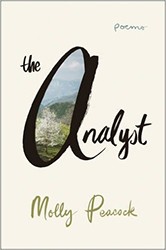
Earlier this week, poet Molly Peacock reflected on her upbringing in a Jewish neighborhood as an Irish Protestant. With the release of her collection The Analyst this week, Molly is guest blogging for the Jewish Book Council all week as part of the Visiting Scribe series here on The ProsenPeople.
By New Year’s week of 1982 I have become an independent, divorced, goyishe young woman of 31. I am about to tell my analyst Joan Stein the story of the boy who picked up the mop. I live in a tiny studio apartment on the Upper East Side of Manhattan; her office is in her home, a one-bedroom apartment in a comfortable building on the Upper West Side, near Zabar’s. Waking up from dreams where my father has vaporized into toxic smoke that seeps beneath my apartment door, I schlep through the city slush and at last show up in her office. We begin each session sitting across from one another: I tell her about the poems I’ve gotten published and wait for her to beam her famous smile of approval. Dark-haired, high-cheekboned, she outlines that smile in clear, direct red lipstick.
Then, as I swing my feet onto the couch and lie down, she switches to the chair at the far end just behind my head. Now the analysis begins. Reliving the half-dream of the seeping toxic smoke of my father, I realize I hope always to keep my wits about me, always to be ready to scramble across a room and pick up a mop and fake my way to safety. That’s when I tell about the boy. A talisman I’ve latched onto. She doesn’t discuss whether I’ve appropriated a tragic story for my less-than-tragic life. She doesn’t tell me to embrace an Irish myth because I have no right to internalize a story from the Holocaust. Joan doesn’t remind me that my father didn’t kill me. (I always put those knives away.) Or that I escaped from my family. She doesn’t remind me that I overcame the fear of claiming myself as a poet (with her help). Instead, she waits. And waits.
When I finally burst into the tears I always seem to save for the end of a session, just when I have to leave in a disheveled mess, she speaks. Just a little bit. Reminding me of my habit of hyper-vigilance, something I shared with some of my elementary school classmates who were children of survivors.
Years later, after her stroke, and after she is forced to close her practice, I learn about Joan’s own father, an attorney, who died when she was seventeen. He had encouraged her to take independent painting lessons. He and her mother sent her to a special art summer school. She was determined to become a painter. A neighbor helped her to apply to Radcliffe, and the bright, electric Joanie Workman, as she was called then, was accepted. She entered Radcliffe in 1953, and the Dean sent her to study with T. Lux Feininger, the son of the modernist painter Lyonel Feininger. Raised in the tradition of Bauhaus painting, T. Lux Feininger embraced abstraction. Although he and his family fled the Nazis to settle in New York, he enlisted in the United States Army and fought in Europe. Traumatized, he returned to New York, and after seeing a therapist himself, moved to Boston and his job at Harvard. When bright, 17-year-old Joanie Workman appeared in class, he was not interested in her mournful paintings of the father she had just lost. T. Lux was determined that the T‑square, and not the organic, messy shapes of life, the ones he had suffered, should rule post-war art. Joan Stein recalls his critique of her portraits of her father as “excoriating.” That’s how it felt to the girl whose father had left a great hole in her life even as bombs had burst holes in her professor’s life.
“…your Radcliffe professor taught:/ all drawing is thought,” I write in the second poem in The Analyst, “To you, abstraction was lying./ All you did was draw your father failing,/then dying…”
What did she do after the “excoriating” critique? She turned on her heel and left the class. Never went back. Declared a Psychology major. Graduated early to marry. Moved to Seattle. Had two sons. Did graduate work at the University of Washington. Divorced. Moved to New York City. Never picked up a brush for twenty-five years.
…brushes you exchanged for words
drawing from what you heard,
the lines of your patients’ inner lives…
Molly Peacock is the author of six previous collections of poetry, including The Second Blush and Cornucopia: New and Selected Poems. Her poems are included in The Oxford Book of American Poetry and appear in leading literary journals internationally. President Emerita of the Poetry Society of America, she co-created Poetry in Motion, a program of placards on subways and buses. Awarded fellowships from the Ingram Merrill, Woodrow Wilson, and Leon Levy Foundations, the National Endowment for the Arts, and the Canada Council for the Arts, Peacock is also author of a biography, The Paper Garden: Mrs. Delany Begins Her Life’s Work at 72, and a memoir, Paradise, Piece by Piece. She is based in Toronto and New York.



